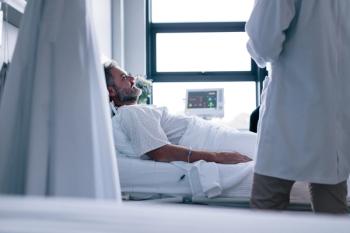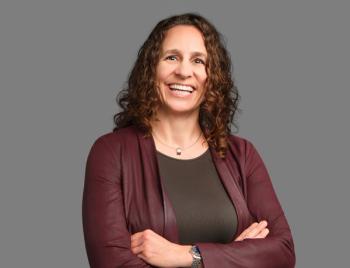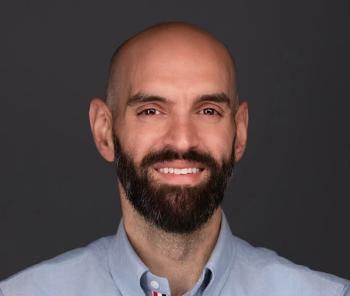
PX: Top 5 Strategies For Navigating Healthcare's Digital Transformation
Five of the brightest minds in health tech offer five unique perspectives on the short- and long-term moves that matter most for the modern hospital exec.
When five of the brightest minds in healthcare technology come together, here’s what you get: Five perspectives on the short- and long-term moves that matter most. Five new ways to embrace and implement technology. Five reasons to remain flexible in the face of change. And five nuggets of wisdom that’ll make for a more secure, better-positioned hospital with happier physicians and healthier patients.
Top Five Strategies For Navigating Healthcare's Digital Transformation
A Healthcare Analytics News® Peer Exchange®
Segment 13/13
Kevin R. Campbell, MD: If you guys could give one piece of advice to the CEO, the physician leader, or the chief of staff of the big hospital systems when it comes to disruption, what one piece of advice — let’s just go around the table — would you give?
Geeta Nayyar, MD, MBA: I say hire me and Kevin.
Kevin R. Campbell, MD: I like that idea.
Geeta Nayyar, MD, MBA: You need people like me and Kevin at the table, just like you need Jane, John and Colin. And sometimes, they just don’t think about us. I don’t know why, Kevin.
Kevin R. Campbell, MD: I don’t know either. My résumé is out there.
Colin Hung, BaSC: I would say one piece of advice I would give them would be, be open. I mean that in both the physical sense as well as the metaphorical sense. Be open to new ideas, but open your doors as well. If you’re a hospital, if you’re a physician practice, you’re fairly close to innovators. If someone comes to your door and says, “Hey, look, I’ve got something and I’m working on it,” give them a little bit of time. I know there are a lot of forces working against you on that, but try because they might be the next thing or that’s going to help you and your community, you and your region, and you and your patients. I think right now, we’re very closed. It has to happen internally, it’s internally driven. I would say my advice would be just be open: Be open to those new ideas and be open to those people who come knock on the door.
Kevin R. Campbell, MD: Those are great words.
Geeta Nayyar, MD, MBA: He didn’t say move to Canada though.
Colin Hung, BaSC: And move to Canada.
Kevin R. Campbell, MD: John?
John Nosta, BA: Own the data. I think data are the third fundamental window into humanity. The first was the telescope, and we all know what happened to Copernicus. He got in trouble. The second was the microscope that gave rise to this realization that the world is much more complex, almost analogous to the gut biome today. That third window into humanity will be the ability of Big Data to find profound connections between us and clinical insights. We all remember the movie “Six Degrees of Separation” [and game] with Kevin Bacon, where we’re all connected by five people. Between us here, we know everyone in the world. Isn’t that a profound revelation? We know everyone in the world. What we will do is have not 6 degrees of separation but six degrees of connection. It will become five degrees, four degrees, three degrees, down to two degrees, where the power of data will connect the number of times I open my refrigerator with the RR variability of my EKG [electrocardiograph] and tell me the likelihood of having metabolic syndrome by age 50. It will be that profound, and those are the game changers that will really change medicine and change the world.
Kevin R. Campbell, MD: Jane?
Jane Sarasohn-Kahn, MA, MHSA: Building on all of you — I am the force of the kumbaya here, I think — is that it takes an ecosystem, it takes a village. Healthcare is complicated. We need pharmaceuticals, we need local banks to help people figure out how to be financially well while they pay for their medical bills. We need our physicians, our nurses, our hospital administrators, and we’re in an era where people are demonizing each other across civilization, particularly in this country. But we’re seeing it where I work, in Europe, in Britain, in Germany, in the Netherlands and elsewhere.
I think we cannot solve our healthcare crisis, and we are in crisis in America — Americans mostly agree in the latest Gallup Poll that healthcare is a crisis — without bringing everyone to the table, every stakeholder, to solve these problems and work it out. While John used the phrase “Own the data,” I’m going to use the phrase, “Share the data,” because they’re complicated data. Data are coming from all these different places, from our bodies, from our cars, from our refrigerators, and from the Internet for healthy things. That takes a village, and we really need to get there and come together as John Lennon would say.
Kevin R. Campbell, MD: I’ll tell you, this has been an extremely informative, very spirited dialogue, and it’s really been my pleasure to be here with each of you. It’s clear to me that we must disrupt the healthcare space in order to continue to improve care throughout the world. Before we end this discussion today, I want to get final thoughts from each and every one of you guys. We’ll start with Colin and go around the table, but thank you all for being here. I’ve learned something, and I hope all of our viewers have as well.
Colin Hung, BaSC: My final thought is I’m excited about innovation. I’m excited at this time in our history with all the things happening in genomics, AI [artificial intelligence] and robotics. I’m looking forward to this next phase, so I’m very excited by what’s happening in healthcare right now.
Geeta Nayyar, MD, MBA: I’ll pivot off of that. I remain very optimistic. There are so many challenges, we all know that, but with them comes the opportunity to include all of your stakeholders. Remember the doctor is just as important as the patient, and don’t be afraid to fail. There’s no magic sauce. We’re all here talking about the fact that there isn’t, so it’s OK. But, again, there’s plenty of opportunity and there’s plenty of money to be made.
Jane Sarasohn-Kahn, MA, MHSA: I would say it takes a village. Let’s make sure when we deploy technology, it’s inclusive and doesn’t create divides the way other technologies have created, such that the algorithms are good actors and not out there with malfeasance baked into them.
Kevin R. Campbell, MD: John?
John Nosta, BA: Today is truly an inflection point in human history. The future begins today, now. It is within our grasp, and if you ask what happened in the year 2000, the answer is nothing. Y2K didn’t happen. But what we’re seeing is in 2007, there was the emergence of the smartphone. We’re seeing data storage, AI, and so many things happening today. I think we have to just take a step back and understand how lucky we are to be alive now. Because the next 100 years will bring with it, as Ray Kurzweil says, something equivalent to the last 20,000 years of human history. A girl born today has a 1 in 3 chance of living to 100. That 100 years is our opportunity to truly change the next 100 to come.
Kevin R. Campbell, MD: I’d just like to say that I think it’s imperative for everyone watching today to remember to never, ever be afraid to reinvent yourself. You may have gone to medical school, MBA school, or PhD school, whatever it was, and you may have decided that you wanted to do X, Y and Z for the rest of your life. Be willing to learn, be willing to listen, just like all the panelists have. Be willing to pivot, continually reinvent yourself every single day, and make the biggest and best contribution you can to society. With that, I’d like to thank all of you guys for your contributions to today’s discussion. On behalf of our panel, we thank you all for joining us. We hope you found this Healthcare Analytics News® Peer Exchange discussion to be useful and informative.
Get the best insights in healthcare analytics
Related:




















































































